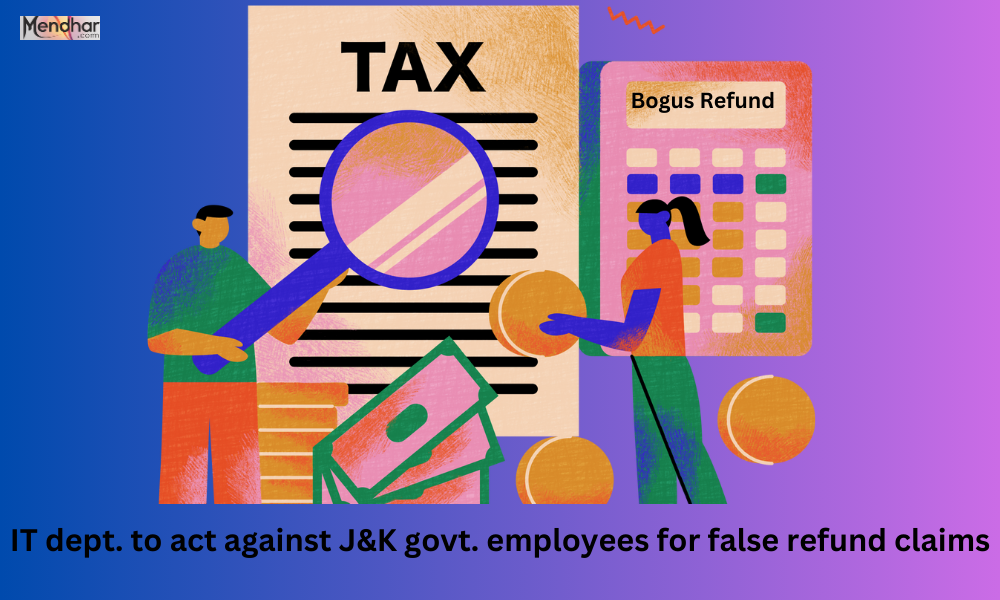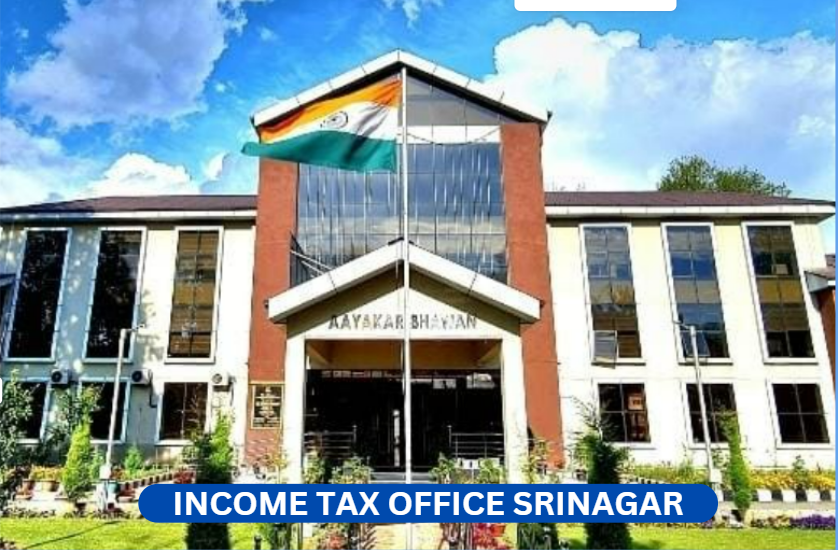News is circulating that the Income Tax Office has issued notices to numerous government employees for falsely claiming refunds under various sections. The Principal Commissioner of Income Tax, J&K and Ladakh, has informed the Finance department that stringent action will be taken against all defaulters or erring employees who have made excessive deductions. Many employees from departments such as Education, Health, PDD, PHE, Cooperatives, Sports, Tourism, Industry, PWD, and Police have been found claiming undue deductions under sections like 8OC,8OD, 80DD, 80DDB, 80EB, 80EB, ,80EE, 80EEB,80G, 80GGC despite being ineligible, which does not align with their income profile.

Table of Contents
ToggleLet's understand what these sections, 80C, 80D, 80DD, 80DDB, 80EB, 80EE, 80EEB, 80G, 80GGC of the Income Tax Act stand for:
| Section | Description | Example |
|---|---|---|
| 80C | Deductions on certain investments and expenses | Investment in ELSS mutual funds, PPF contributions |
| 80D | Deductions on health insurance premiums | Premium paid for health insurance policies |
| 80DD | Deductions on expenses for disabled dependents | Expenses for the medical treatment of a disabled dependent |
| 80DDB | Deductions on expenses for specified diseases | Medical treatment expenses for specified diseases |
| 80EB | Deductions on profits from housing projects | Profits derived from affordable housing projects |
| 80EE | Deductions on home loan interest for first-time buyers | Interest on home loan for first-time homebuyers |
| 80EEB | Deductions on interest on loans for electric vehicles | Interest on loans for the purchase of electric vehicles |
| 80G | Deductions on donations to certain funds and charities | Donations to approved charitable organizations |
| 80GGC | Deductions on contributions to political parties | Contributions made to political parties |
Let's discuss each sections one by one:
Section 80C of the Income Tax Act:
Section 80C of the Income Tax Act allows individuals to claim deductions on certain investments and expenses up to a specified limit. Let’s elaborate on this with an example:
Suppose an individual, let’s call them John, has a taxable income of ₹8 lakh for the financial year. Now, John decides to invest in two different avenues eligible under Section 80C:
- ₹1.5 lakh in Equity Linked Savings Scheme (ELSS) mutual funds.
- ₹50,000 in a Public Provident Fund (PPF) account.
Now, according to Section 80C, John can claim a deduction of up to ₹2 lakh for these investments and contributions.
So, in this case, John can claim a deduction of ₹2 lakh from his taxable income. As a result, his taxable income reduces to ₹6 lakh (₹8 lakh – ₹2 lakh).
By claiming this deduction under Section 80C, John effectively reduces his tax liability for the financial year. This deduction encourages individuals to save and invest for their future while providing them with tax benefits.
Section 80D of the Income Tax Act:
Section 80D of the Income Tax Act allows individuals to claim deductions on health insurance premiums paid for themselves and their family members. Let’s illustrate this with an example:
Suppose there’s an individual named Sarah who pays an annual premium of ₹25,000 for her health insurance policy that covers herself, her spouse, and her children.
According to Section 80D, Sarah can claim a deduction of up to ₹25,000 for the health insurance premium paid for herself, her spouse, and dependent children. Additionally, if Sarah’s parents are senior citizens, she can claim an additional deduction of up to ₹50,000 for the health insurance premium paid for them.
Let’s assume Sarah’s parents are not senior citizens for this example.
So, in this case, Sarah can claim a deduction of ₹25,000 from her taxable income for the health insurance premium paid.
If Sarah’s taxable income before claiming this deduction is, for example, ₹6,00,000, after claiming the deduction of ₹25,000 under Section 80D, her taxable income would reduce to ₹5,75,000.
By utilizing this deduction under Section 80D, Sarah not only secures health coverage for herself and her family but also reduces her tax liability, thus promoting healthcare expenditure and insurance coverage.
Section 80DD of the Income Tax Act:
Section 80DD of the Income Tax Act allows individuals to claim deductions for expenses incurred on the medical treatment, training, rehabilitation, or maintenance of a dependent with a disability. Let’s illustrate this with an example:
Consider a taxpayer named Alex, who has a dependent sibling with a disability. Alex incurs ₹80,000 annually for the medical treatment and care of his disabled sibling.
According to Section 80DD, Alex can claim a deduction of up to ₹1.25 lakh for the expenses incurred on the medical treatment and care of his dependent sibling with a disability.
So, in this case, Alex can claim a deduction of ₹80,000 from his taxable income for the expenses incurred on the medical treatment and care of his dependent sibling.
If Alex’s taxable income before claiming this deduction is, for example, ₹7,00,000, after claiming the deduction of ₹80,000 under Section 80DD, his taxable income would reduce to ₹6,20,000.
By utilizing this deduction under Section 80DD, Alex not only supports the medical needs of his disabled dependent but also reduces his tax liability, thereby encouraging support and care for individuals with disabilities.
Section 80DDB of the Income Tax Act:
Section 80DDB of the Income Tax Act allows individuals to claim deductions for expenses incurred on the treatment of specified diseases for themselves or their dependents. Let’s elaborate on this with an example:
Let’s consider an individual named Maya who suffers from a specified disease and incurs ₹40,000 annually for her treatment.
According to Section 80DDB, Maya can claim a deduction of up to ₹40,000 for the expenses incurred on the treatment of the specified disease for herself.
So, in this case, Maya can claim a deduction of ₹40,000 from her taxable income for the expenses incurred on her treatment.
If Maya’s taxable income before claiming this deduction is, for example, ₹5,00,000, after claiming the deduction of ₹40,000 under Section 80DDB, her taxable income would reduce to ₹4,60,000.
By utilizing this deduction under Section 80DDB, Maya not only receives financial relief for her medical expenses but also reduces her tax liability, thereby promoting access to healthcare for individuals suffering from specified diseases.

Section 80EB of the Income Tax Act:
Section 80EB of the Income Tax Act provides a deduction for profits earned by developers from affordable housing projects. Let’s elaborate on this with an example:
Suppose there’s a developer named Rahul who earns ₹5 lakh as profits from an affordable housing project that meets the criteria set forth by the government for such projects.
According to Section 80EB, Rahul can claim a deduction on the profits earned from this affordable housing project. The deduction amount is calculated as 100% of the profits derived from the project.
So, in this case, Rahul can claim a deduction of ₹5 lakh from his taxable income under Section 80EB for the profits earned from the affordable housing project.
If Rahul’s taxable income before claiming this deduction is, for example, ₹10 lakh, after claiming the deduction of ₹5 lakh under Section 80EB, his taxable income would reduce to ₹5 lakh.
By utilizing this deduction under Section 80EB, Rahul not only promotes the development of affordable housing but also reduces his tax liability, thereby incentivizing investment in such projects.
Section 80EE of the Income Tax Act:
Section 80EE of the Income Tax Act provides a deduction for interest paid on a home loan by first-time homebuyers. Let’s elaborate on this with an example:
Consider an individual named Priya who is a first-time homebuyer. She purchases a house and takes a home loan, on which she pays ₹2.5 lakh as interest during the financial year.
According to Section 80EE, Priya can claim a deduction of up to ₹50,000 on the interest paid on her home loan, provided certain conditions are met. One of the conditions is that the loan must be sanctioned by a financial institution between April 1, 2016, and March 31, 2017, and the value of the property purchased should not exceed ₹50 lakh.
So, in this case, Priya can claim a deduction of ₹50,000 from her taxable income for the interest paid on her home loan.
If Priya’s taxable income before claiming this deduction is, for example, ₹6,00,000, after claiming the deduction of ₹50,000 under Section 80EE, her taxable income would reduce to ₹5,50,000.
By utilizing this deduction under Section 80EE, Priya not only receives financial relief for her home loan interest but also reduces her tax liability, thereby encouraging homeownership among first-time buyers.
Section 80EEB of the Income Tax Act :
Section 80EEB of the Income Tax Act provides a deduction for interest paid on loans taken for the purchase of electric vehicles. Let’s elaborate on this with an example:
Suppose there’s an individual named Aryan who takes a loan of ₹10 lakh for purchasing an electric vehicle. During the financial year, he pays ₹1 lakh as interest on this loan.
According to Section 80EEB, Aryan can claim a deduction of up to ₹1 lakh on the interest paid for the loan taken to purchase the electric vehicle.
So, in this case, Aryan can claim a deduction of ₹1 lakh from his taxable income for the interest paid on the loan for the electric vehicle.
If Aryan’s taxable income before claiming this deduction is, for example, ₹8,00,000, after claiming the deduction of ₹1 lakh under Section 80EEB, his taxable income would reduce to ₹7,00,000.
By utilizing this deduction under Section 80EEB, Aryan not only receives financial relief for his interest expenses on the electric vehicle loan but also contributes to promoting the adoption of eco-friendly transportation options, thus reducing his tax liability.
Section 80G of the Income Tax Act;
Section 80G of the Income Tax Act allows taxpayers to claim deductions for donations made to approved charitable organizations. Let’s elaborate on this with an example:
Suppose there’s a taxpayer named Lisa who donates ₹20,000 to an approved charitable organization during the financial year.
According to Section 80G, Lisa can claim a deduction of up to ₹20,000 from her taxable income for the donation made to the approved charitable organization.
So, in this case, Lisa can claim a deduction of ₹20,000 from her taxable income for the donation made to the charitable organization.
If Lisa’s taxable income before claiming this deduction is, for example, ₹6,00,000, after claiming the deduction of ₹20,000 under Section 80G, her taxable income would reduce to ₹5,80,000.
By utilizing this deduction under Section 80G, Lisa not only supports a charitable cause but also reduces her tax liability, thereby encouraging philanthropy and social welfare contributions.
Section 80GGC of the Income Tax Act:
Section 80GGC of the Income Tax Act allows individuals to claim deductions for contributions made to political parties. Let’s elaborate on this with an example:
Consider an individual named Rohan who contributes ₹30,000 to a political party during the financial year.
According to Section 80GGC, Rohan can claim a deduction of up to ₹30,000 from his taxable income for the contribution made to the political party.
So, in this case, Rohan can claim a deduction of ₹30,000 from his taxable income for the contribution made to the political party.
If Rohan’s taxable income before claiming this deduction is, for example, ₹8,00,000, after claiming the deduction of ₹30,000 under Section 80GGC, his taxable income would reduce to ₹7,70,000.
By utilizing this deduction under Section 80GGC, Rohan not only exercises his political participation but also reduces his tax liability, thereby encouraging contributions to the political process.
Certainly! If someone has made an error or violated any provisions of the Income Tax Act by claiming deductions incorrectly, they can rectify their mistake by filing a revised Income Tax Return (ITR) under Section 139(8A) of the IT Act. This allows them to withdraw any incorrect claims and ensure compliance with the tax laws.
| Financial Year | Assessment Year | Last Date to File Updated ITR |
|---|---|---|
| 2020-21 | 2021-22 | 31st March 2024 |
| 2021-22 | 2022-23 | 31st March 2025 |
| 2022-23 | 2023-24 | 31st March 2026 |
It has been further advised that updated ITRs for the relevant years may be filed immediately without waiting for due dates, as delay in filing ITRs will result in issuance of show cause notices/selection of cases under scrutiny besides payment of additional taxes as per the following details:
a. If ITR is filed within 12 months from the end of the relevant Financial year – the assessee will have to pay 25% of the total amount of tax and interest as additional tax.
b. If ITR is filed within 12 to 24 months from the end of the relevant Financial year – the assessee will have to pay 50% of the total amount of tax and interest as additional tax.



Hi there
I have just took a look on your SEO for mendhar.com for the ranking keywords and saw that your website could use an upgrade.
We will improve your ranks organically and safely, using only state of the art AI and whitehat methods, while providing monthly reports and outstanding support.
More info:
https://www.digital-x-press.com/unbeatable-seo/
Regards
Mike Nevill
Digital X SEO Experts
Pingback: SO 176: Empowering Pahari Speaking Peoples via ST Reservation -